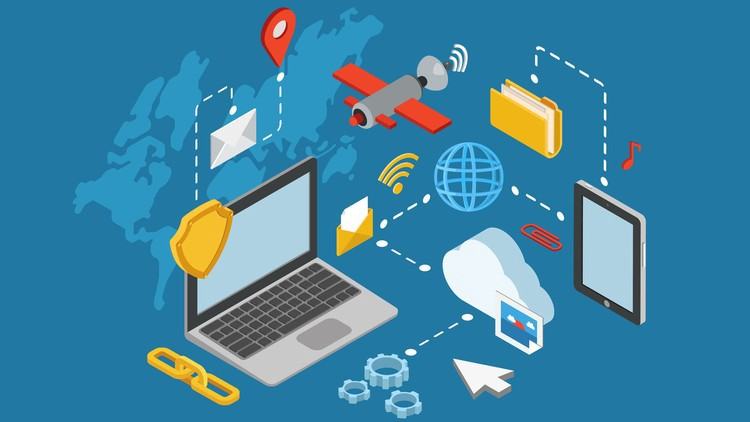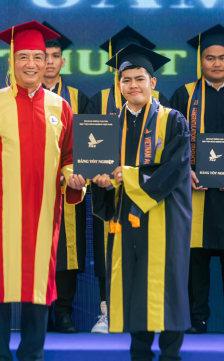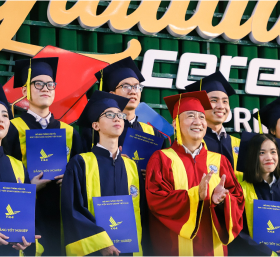
General Objectives
The undergraduate education program in Aviation Telecommunication Electronics Engineering Technology is designed to equip students with comprehensive, fundamental, and modern knowledge, ensuring that upon graduation, they can fulfill the duties of an engineer in the field of Telecommunication Electronics and adapt to the continuous technological advancements in the industry.
After graduation, students can work in companies and enterprises in the field of Telecommunication Electronics within the aviation industry and other technical-economic sectors. Outstanding students may also have the opportunity to teach at universities or work in research institutes.
Possess the ability to self-study and conduct research to keep up with the industry's developments. Proficient in information technology and foreign languages.
Knowledge of Vietnamese and International Culture: Students have foundational knowledge of Vietnamese culture and the cultures of other countries around the world.
Knowledge of Natural Sciences, Information Technology, and Foreign Languages: Students possess basic knowledge of natural sciences and know how to apply it to their professional work. They are proficient in basic information technology, using office software and industry-specific applications, and hold a basic application of information technology certificate or equivalent. Regarding foreign languages, students achieve a minimum TOEIC score of 500 or an equivalent international certificate, and also hold an advanced application of information technology certificate or equivalent.
Students also have a solid understanding of automatic control theory, electrical safety, and electrical engineering techniques, with the ability to apply these effectively in reasoning, analysis, and synthesis to address and develop problems within the industry and their specialized field of study.
Students also have a solid understanding of computer networks, information electronics, embedded systems, and system programming, with the ability to link industry knowledge with foundational and specialized platforms to address professional issues.
They also possess a solid understanding of microelectronic systems, radio and telecommunication systems, particularly those in the aviation sector (such as radio navigation systems, aviation ground communication and guidance systems, etc.).
Students are capable of applying specialized knowledge, combining it with foundational and industry-specific knowledge, to solve most in-depth professional issues.
Presentation and Writing Skills in Vietnamese: Able to present fluently, concisely, and confidently in front of an audience, as well as write accurate and properly formatted internal and external documents.
Communication and Writing Skills in English: Able to present briefly and clearly, confidently in front of an audience; write short documents correctly and appropriately; and understand English materials related to work.
Natural and Social Sciences Problem-Solving Skills: Use knowledge of natural and social sciences to analyze, synthesize, and solve professional issues.
General Professional Problem-Solving Skills: Solve simple tasks quickly and accurately, and collaborate to handle complex issues.
Specialized Problem-Solving Skills: Effectively solve complex tasks with creativity through research and collaboration.
International Integration Skills: Good communication skills and the ability to establish relationships with foreign partners, colleagues, superiors, and subordinates, contributing to improved work performance and problem-solving.
Responsibility to Community and Society: Aware of the importance of environmental protection and actively participates in community support programs through practical actions.
Responsibility to Colleagues and Work: Demonstrates team spirit, solidarity, and mutual support with colleagues, always prioritizing the collective benefit over personal interests and emphasizing working for the common good.
Good Health: Maintains good health and a habit of physical exercise, regularly participating in sports and fitness activities.

No Criminal Prosecution: Students must not be under criminal investigation or subject to disciplinary action resulting in suspension from studies at the time of graduation review.
Completion of Required Credits: Students must complete the required number of courses as outlined by the university's undergraduate program, with no outstanding credits, and an overall GPA of 2.0 or higher.
National Defense and Security Education Certificate: Students are required to obtain a certificate in national defense and security education, as well as a participation certificate for the student week issued by the Department of Organization and Student Affairs.
Foreign Language and Information Technology Proficiency: Students must achieve a minimum TOEIC score of 500 or an equivalent international certificate, along with an advanced application of information technology certificate or equivalent.

Ethical Qualities and Professional Morality: Possess moral integrity, a sense of civic responsibility, understanding, and the ability to live and work according to the law, in line with the standards outlined in Decision No. 50/2007/QĐ-BGD&ĐT by the Ministry of Education and Training.
Modesty and Simplicity: Maintain a clean and healthy lifestyle. Be careful and responsible in work, always striving for professional growth and expertise.
Respect for the Law: Uphold the law and fulfill the duties and responsibilities of a citizen.
Physical Health: Maintain sufficient physical health to work effectively in the chosen profession.
Military and National Defense Knowledge: Possess basic knowledge and skills in military work and national defense participation.

Graduates have the ability to work in the following roles, either as operators, direct designers, or technical managers and coordinators:
Companies and Enterprises: Work in electronics, telecommunications, computer networks, and semiconductor manufacturing companies.
Telecommunication Network Consulting and Design Firms: Participate in companies specializing in transmission, telecommunication network devices, and information technology.
Technology-Related Companies and Enterprises: Work in companies and enterprises operating in the fields of technology, electronics engineering, telecommunications, and information technology, both within and outside the aviation sector.
Maintenance and Product Testing Engineers: Can assume roles as maintenance engineers, product testing engineers, or production engineers in aviation industry units and related fields.
Degree Upon Graduation
Telecommunication Electronics Engineering Technology Engineer



Training Program
150 credits (excluding Physical Education and National Defense Education courses)
- Training Program: 2020, 2021, 2022, 2023
- Framework Program: Khóa 24 trở về sau.
- Website of the Department of Electrical and Electronics Engineering: https://feee-vaa.edu.vn/





